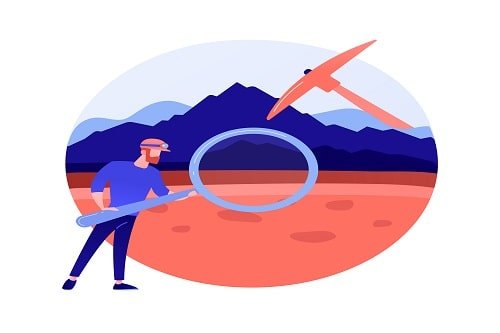Table of Contents
With the significant potential of the Geology field, employment opportunities for geoscientists are estimated to grow by 7% from 2020 to 2030. As many as 3100 openings are projected for geologists every year. One of the best qualifications to equip aspirants with the relevant knowledge and skills for this field is B.Sc. Geology.
This program helps students lay a foundation for a career in Geology! Completing this course gives students significant opportunities such as becoming a geoscientist, executive geologist trainer, and Geology project assistant.
So, let’s learn all about the B.Sc. Geology program and how you can pursue the course!
But first, what is Geology?
A dynamic field with an incredible national and international scope, Geology, is the study of the Earth and its related components. The solid and liquid elements, comprising the Earth’s surface and its crust are responsible for several processes. As a result, these processes affect the human species in many ways. Volcanic eruptions, floods, and landslides are various processes explained by the science of the Earth’s physical components.
The development of the planet goes back as far as 4.4 billion years ago. Geology is the science that explains how continents, oceans, and the atmosphere has become what it is today.
Are you intrigued about knowing how you can pursue a course in Geology? If yes, then read ahead!
Bachelor of Science in Geology
A Bachelor of Science in Geology is a 3-year undergraduate study focused on equipping students with the knowledge of Earth science. The program includes subjects that are related to the properties of the Earth’s surface and celestial bodies, such as meteors.
Eligibility Criteria
If you are seeking admission in this recognized program, the eligibility criteria include:
- Completing 10+2 examinations with 55% and above in Mathematics, Physics, and Chemistry.
- Additionally, you need to crack the entrance exams conducted by universities to gain admission to their program.
- Also, the minimum for pursuing this course is 17 years.
Admission Process

Most colleges or universities either conduct their own entrance exams or provide admissions based on the results of a competitive exam. Besides, there may be colleges that provide admission based on merit in 10+2 examinations.
The process for admission to most undergraduate Geology programs is as follows:
1. Completing the application
All universities will have an online application form that documents all relevant information of the candidate. The first step to enter this course is to submit this application form and complete the initial payment.
You will find most application forms on the official website of the university. The website will also have necessary information detailing the steps towards admission and the documents you need to submit.
2. Review of application
An internal team of the university will review your application for admission based on these points.
- The cumulative grade scored in higher secondary examinations.
- Proficiency in English (based on your IELTS/TOEFL score).
- Co-Curricular Activities and Interests
- Written Ability
- Consistent Academic Performance
3. Entrance exam
Most universities will have a specialized entrance exam for you to attempt for entering your chosen program. These exams often vary from university to university. However, some national-level papers allow students’ admission to programs across multiple universities. But, you need to clear the set exam with a minimum score to qualify for the next step in the process.
4. Interview and Group Discussions
As a part of the admission process, you need to display a certain level of proficiency in knowledge, aptitude, written and spoken abilities. In most cases, you are questioned on current affairs and developments in your chosen field of interest.
Group discussions help admission officers to know an aspirant’s ability to debate and comment on various national and international affairs. Besides, these can display all-rounded knowledge and enthusiasm in learning.
Fees of the Program
While the fees of a Bachelor of Science (Geology) program may vary from university to university, aspirants can expect to shell out $20,000 to $45,000.
Syllabus of B.Sc Geology program

Most 3-year undergraduate Geology programs have a series of 6 semesters. Some of the subjects covered in each semester of a Bachelor of Science (Geology) program includes:
Semester I
- Structural Geology
- Earth Science
- Physical Geology and Geomorphology
Semester II
- Crystallography and Mineral Optics
- Mineralogy
- Geochemistry
- Mineral Science
Semester III
- Stratigraphic Principles
- Igneous Petrology
- Paleontology
Semester IV
- Sedimentary Petrology
- Metamorphic Petrology
- Exploration Geology and Remote Sensing
- Economic Geology
Semester V
- Indian Stratigraphy
- Hydrogeology
- Engineering Geology
Semester VI
- Engineering and Mining Geology
- Environmental Geology
- Natural Resource Management
Jobs after B.Sc Geology
Armed with a Bachelor of Science (Geology) qualification, you can consider numerous job profiles available, such as:
1. Geologists – This is one of the most recognized jobs after B.Sc. Geology. Geologists study the numerous components that create the structure of the Earth, in addition to other terrestrial planets. They travel to different sites across the world. Then, they gather accurate samples, develop research proposals, and analyze the data to reach a conclusion.
2. Mine Supervisors – Mine Supervisors are primarily responsible for conducting and managing all mining activities. These professionals ensure that the safety of all mineworkers is taken into consideration. Besides, they also supervise targets, ensuring that requirements are met with the highest quality.
3. Hydrogeologists – Hydrogeologists are trained to work with underground water. Their responsibilities include monitoring and analyzing the flow of underground water. From this information, the distribution, quality, and quantity are determined to help preserve natural reserves.
4. Petroleum Geologists – Petroleum Geologists are scientists who work in the Petroleum Geology industry. They deal with all aspects of combustible resources buried under the Earth. These include extraction, estimation, and processing of petroleum, gas, and oil.
5. Paleontologists – Palaeontologists are scientists who study the fossils of extinct species of flora and fauna. These professionals work in many settings, including fieldwork for research, institutions, and laboratories.
Key Takeaways
- Geology is a dynamic and engaging field with brilliant potential for national and international societal benefits.
- A Bachelor of Science (Geology) program is one of the most recognized programs to enter the field of Geology.
- A minimum eligibility criterion is required to be met for aspirants to gain admission to this program.
- The syllabus of B.Sc Geology is extensive and covers a wide range of niches present within the field.
- With a degree in Geology, aspirants can pursue several lucrative careers aligning with their interests and professional goals.
That’s all we have for you in this blog! If you want to know more about pursuing this course or choosing a university, drop a comment. Alternatively, you can also reach out to us! We’d be happy to help.
FAQs
Q1. What does a marine geologist do?
Answer – A marine geologist analyses and surveys geophysical, geochemical and geological locations. This helps professionals come to reliable conclusions on the impact of environmental changes on the oceans and seas.
Q2. What are the top Bachelor of Science (Geology) colleges?
Answer – Some of the top B.Sc Geology colleges include:
- Massachusetts Institute of Technology (MIT), USA
- University of British Columbia, Vancouver, Canada
- ETH Zurich – Swiss Federal Institute of Technology, Switzerland
- University of Oxford, UK, and more!
Q3. Can I pursue an MBA after a B.Sc Geology program?
Answer – If you meet the eligibility requirements of the university, it is possible to pursue an MBA after a B.Sc Geology program.






